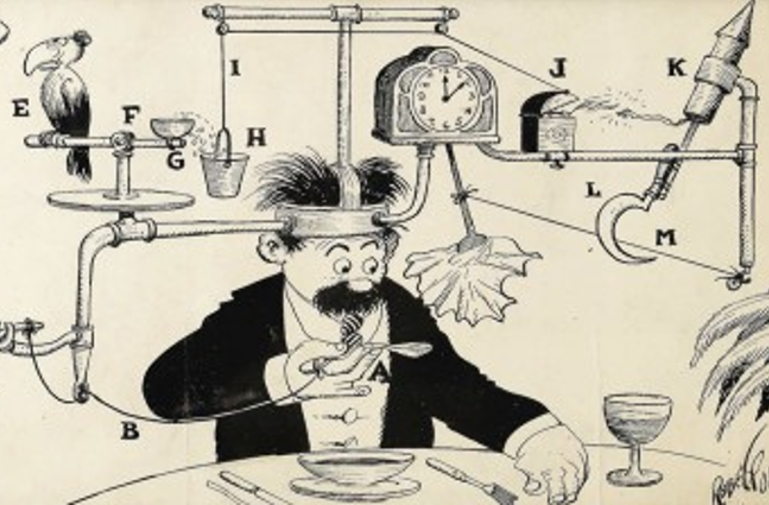When we think of technology, we generally think of machines and gadgets that populate our life. For those in industry, the word may mean a process with many steps for the manufacture of a product—products that include things as complex as a computer and as simple as a potato chip.
For the ancient Greeks the word techne—from which we get technology—referred to what they called the mechanical arts—which in our day would be all of industry and commerce geared toward the practical ends of survival and for the support of other pursuits such as sports and entertainment.
While we watch our technically advanced global society founder as its denizens are once again brought low by another wave of COVID-19, we find ourselves stuck in a loop that tells us we simply need more technology. In this case, we say we need continuous vaccine booster shots. And, of course, we need everyone who hasn’t already done so to receive a vaccine of some sort. While there is considerable evidence that vaccines lessen the severity of an infection and therefore reduce the likelihood of hospitalization and death, they neither prevent COVID nor prevent its transmission.
What we cannot fathom is that technology is just as often the source of problems as solutions, and that more technology often creates more problems. The technology that allows anyone with the money to fly across the ocean in less than a day is a pandemic-promoting technology. The technologies that enable transoceanic and transcontinental shipping are pandemic-promoting technologies. Even long-distance car rides allow us to spread infectious diseases to a frightening extent.
And, it is our far-flung supply chain which makes us dependent on such transportation networks.
Instead of thinking about how we can lessen the obvious paths of cross-border and cross country transmission, we keep doubling down on pharmaceutical technology, thinking it alone will somehow solve the pandemic problem.
Especially egregious is a new drug used to treat COVID patients that works by causing multiple mutations in the virus in an attempt to shut down its replication. Some virologists believe this drug could unleash many new and deadlier strains of COVID. That fear is not a hypothetical concern as each new variant poses novel challenges. If this new drug doesn’t risk obvious and severe dangers of a negative return for society, then nothing does.
Add to this the contribution of our industrial diet laced with pesticides, herbicides and industrial chemical contaminants that spawns chronic diseases such as diabetes, heart disease and many inflammatory ailments which make people less robust in the face of infection. Include the toxic chemicals we absorb from the air and water that do the same, and we end up with a dangerous trifecta of complexity that creates a potent combination of negative returns for our entire global society.
The question we should be asking ourselves is whether we have passed the point when more technology will always provide net gains in stability for our society. Historian Joseph Tainter’s seminal treatise on societal collapse entitled The Collapse of Complex Societies suggests a rough way to judge.
Tainter explains that societies increase complexity as a way to solve problems. The simplest illustration is the training and deployment of specialists, for example, engineers who know how to build irrigation canals. As complexity demonstrates its huge benefits, more specialization and complexity is added and more benefits accrue.
At some point, the complexity no longer adds benefits and even begins to subtract from the stability and wealth of a society. But we humans are so convinced by our past experience that more complexity will solve any problem that we ignore the signs of declining and even negative returns.
I believe that we have now reached the point in our contemporary civilization when complexity has turned against us. The devastating and swift spread of the COVID-19 virus was a product of our efficient, affordable, and complex globe-spanning logistics and transportation system. That system continues to generate a substantial negative return on our complexity when it comes to the spread of COVID. It facilitates the spread of each new dominant variant of COVID across the globe in a matter of weeks. In truth, the vulnerability, the negative return, was already embedded in that system. We just didn’t realize it until now.
And yet even now, practically every leader on Earth is telling us that he or she is plotting a course back to “normal,” that is, to the way things were before the pandemic. No leader of note is telling his or her people that the future will be considerably different from the past. It seems that the public will simply have to figure it out for itself.
The chaos we are experiencing is the product of negative returns on complexity. Many of those who rely on that complexity for maintaining their wealth are desperately trying to prevent a simplification of the systems we live under.
They can try and possibly succeed for a time. But as the necessity of simplification grows, we can either plan for it or plunge headlong into even deeper chaos. So far we are choosing the chaos option.
Image: Original art for Rube Goldberg’s “self-operating napkin” machine. 1931. (Cropped). Via Wikimedia Commons https://commons.wikimedia.org/wiki/File:Self-operating_napkin_(Rube_Goldberg_cartoon_with_caption).jpg






